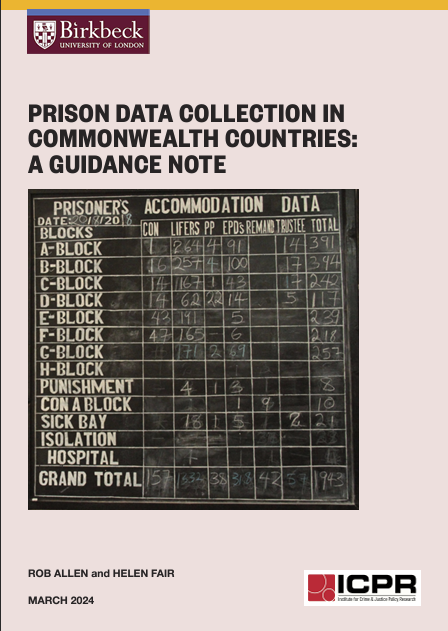Collecting and publishing statistics about the use and practice of imprisonment is a crucial tool for governments to assess the effectiveness of criminal justice policies. Accurate and updated statistics also help to ensure there is sufficient capacity in the prison estate; and enable civil society to monitor overcrowding and associated human rights violations and public health risks in prisons and to generate evidenced proposals for reform.
While prison authorities in almost all countries maintain administrative records about the individuals in their custody, the data is not always used as comprehensively as it might be to produce and use aggregated anonymised statistics.
Low income countries in particular face challenges in collecting systematic data due to lack of electronic systems and shortages of trained staff. This Guidance Note recommends that prison systems which do not have one should develop an electronic database for records which will not only improve individual case management but also enable statistical data to be compiled according to a clear methodology. At least one staff member of sufficient seniority at headquarters should be responsible for data collection, ideally as part of a unit responsible for statistics and research.
When statistics are produced, there is a large variation between countries in the extent to which they are published. In the 56 Commonwealth countries, prison services in only 13 routinely and proactively make data on the prison population available online. Others make headline numbers sporadically available to the media.
This Guidance Note makes the case for regular publication of the most important facts and figures about prisons. It recommends the routine and regular publication of Core Data on
- the number and types of people imprisoned on any one day
- the numbers received into and released from prison over particular periods of time
- the uncrowded capacity of the prison system and how this is calculated.
It also proposes that Additional Data should be made available where possible so as to ensure the greatest possible transparency. This includes more detailed information about the status and characteristics of prisoners, their treatment and conditions of detention, and about numbers of prison staff. The process for making this data available should be clear and accessible to all interested stakeholders.
International agencies and donors should consider how best to equip relevant countries with the resources, technology, know-how and training to introduce a suitable data collection system.

